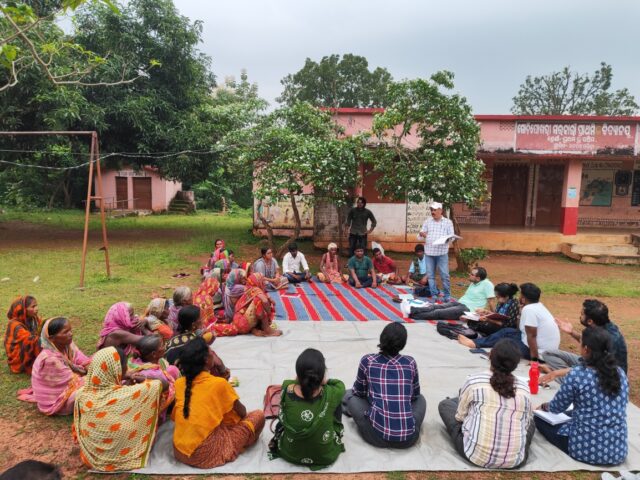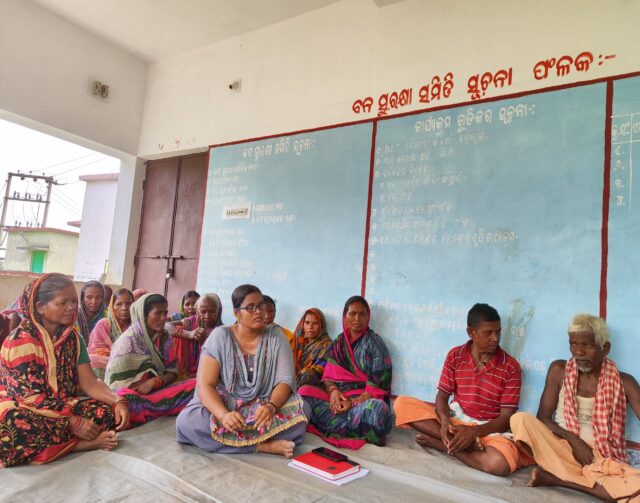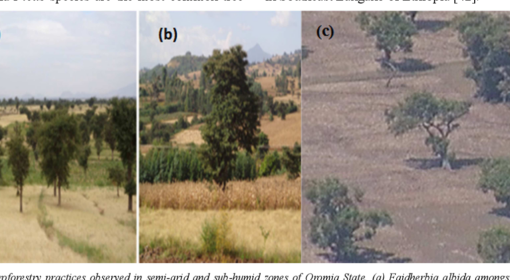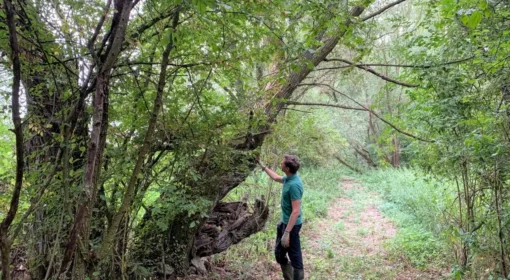By: Shubham Jain,Pratik Ranjan, & Ranjit Mohanty
Forests hold a fundamental place in the traditional way of life for tribal communities. The intricate tapestry of these communities’ social, cultural, and economic systems is intricately interwoven with nature, with forests and other natural resources serving as vital components. In India, according to the Forest Survey of India (2019), approximately 26 per cent of the country’s 650,000 villages are designated as forest fringe villages. In these areas, mainly populated by ‘adivasi’ or ‘tribal’ communities, forests play a pivotal role in meeting crucial socio-cultural and livelihood needs. In 2019, these villages were inhabited by roughly 22 percent of the nation’s total population.
Anthropologists have delved into the symbiotic relationships existing between forests and tribal communities. However, an excessive reliance on these resources without due conservation measures inevitably leads to resource exploitation and degradation. Tribal communities have developed cultural mechanisms and indigenous practices that actively contribute to conserving and restoring forests and natural resources. In pursuing a more sustainable future, one paramount aspect that emerges is the concept of tenure security.
Understanding Tenure Security
Tenure security, as established by the Forest Rights Act (FRA) of 2006, revolves around the crucial task of legally recognizing and safeguarding the rights of forest-dwelling communities. This recognition ensures that these communities can maintain their traditional way of life by residing on and utilising the land and forest resources integral to their traditional way of life. Simultaneously, it promotes responsible and sustainable management and conservation of these invaluable natural resources.
The passage of the FRA in 2006 marked a significant shift in government policy. Before this legislation, the prevailing legal framework primarily focused on conservation through strict regulations and limitations. Regrettably, this approach generated apprehension among forest-dwelling communities and inadvertently led to increased resource exploitation and unsustainable usage. The absence of clear ownership rights over these resources compounded these challenges. As noted by Misra in 2006, “After many successive forest laws passed with no respite for tribal communities, the government realised that if people’s demands are not met, forests cannot be effectively saved.”
Recognizing this growing concern, the government realised that addressing the demands and needs of these communities was integral to the practical preservation of forests. Tenure security, as established under the Forest Rights Act (FRA) of 2006, plays a multifaceted role in the lives of forest-dwelling communities and the conservation of natural resources. It is a cornerstone in ensuring a harmonious coexistence between these communities and their invaluable surroundings. Here, we delve into the diverse aspects of tenure security and outline the steps to uphold it effectively.

Tenure Security: A Foundation for Sustainability
- Safeguarding Livelihoods: Tenure security gives local communities the confidence to utilise their resources thoughtfully. When people have the assurance of resource use, they are more inclined to invest in sustainable practices that secure their livelihoods and lead to long-term prosperity.
- Conserving Ecosystems: Secure tenure rights act as a deterrent to destructive practices driven by short-term gains. Communities vested in resource conservation are more likely to adopt sustainable practices, ensuring the preservation of ecosystems for generations to come.
- Reducing Conflicts: Ambiguity and disputes over resource ownership can often spark conflicts. Tenure security alleviates these tensions by offering clear resource access and usage guidelines, promoting cooperation among community members.
- Resource Management: Forest-dwelling communities with secure tenure rights can actively participate in the management and conservation of forests, contributing to sustainable forest practices.
Implementing Tenure Security Under FRA
Realising tenure security under the Forest Rights Act necessitates a collaborative effort involving government agencies, NGOs, civil society organisations, and, most importantly, forest-dwelling communities. Here are the key steps and measures to ensure its fulfilment:
- Identification and Recognition of Rights: Facilitate and support forest-dwelling communities in filing claims for their rights over forest land and resources, ensuring they comprehend their rights and the requisite documentation. Furthermore, actively involve Gram Sabhas (village assemblies) in verifying and approving these claims, as mandated by the FRA.
- Documentation and Record Keeping: Assist communities in gathering evidence and documentation of their historical occupation and use of forest land and resources, including historical records, maps, and oral testimonies.
- Capacity Building: Provide comprehensive training and capacity-building programs to forest-dwelling communities and Gram Sabha members to enhance their understanding of the FRA, their rights, and the associated processes.
- Mapping and Survey: Conduct surveys and mapping exercises to delineate boundaries for community forest rights, individual rights, and community forest resources.
- Legal Assistance: Ensure communities can access legal assistance and support when filing claims and addressing disputes.
- Social Audits: Facilitate social audits to maintain transparency and accountability in the FRA’s implementation, preventing fraudulent claims and safeguarding the rights of eligible communities.
- Preventing Evictions and Conflicts: Advocate for the prevention of evictions and conflicts between forest-dwelling communities and other stakeholders, promoting peaceful resolution through legal means.
- Community Forest Resource Management Plans: Support communities in developing and implementing Community Forest Resource Management Plans, outlining sustainable forest resource management strategies.
- Awareness Campaigns: Conduct awareness campaigns among forest-dwelling communities to inform them about their rights, the benefits of tenure security, and the significance of sustainable resource management.
- Regular Monitoring and Review: Continuously monitor the FRA’s implementation to uphold tenure security, conducting periodic reviews and evaluations to address emerging issues.
- Advocacy and Legal Action: – Advocate for the rights of forest-dwelling communities at various government levels and, when necessary, take legal action to safeguard these rights.
- Community Empowerment: Empower forest-dwelling communities to engage in forest management decisions and initiatives actively, fostering community-led conservation efforts.

Two noteworthy examples illustrate the tangible benefits of tenure security:
Tendu Leaves in Madhya Pradesh: Tenure security has allowed forest-dwelling communities to participate in the harvesting and marketing Tendu leaves, enhancing their economic well-being while promoting sustainable harvesting practices and the regeneration of Tendu-bearing trees.
Bauxite Mining in Kerala: Secure tenure rights have empowered communities to resist environmentally harmful mining activities, preserving ecosystems and striking a balance between economic development and ecological health.
Conclusion: A Path to Sustainable Coexistence
As the world seeks sustainable development, achieving harmony between human needs and ecological well-being remains a complex challenge. Tenure security, exemplified by the Forest Rights Act of 2006, is India’s commitment to empowering forest-dwelling communities and protecting ecosystems. The cases of Tendu leaves and bauxite mining underscore the tangible benefits of tenure security in enhancing livelihoods and preserving ecological balance. To secure a resilient and sustainable future, fostering an understanding of tenure security’s profound impact on socio-ecological systems is paramount.
References:
Behera, Hari Charan, Forest Policy and Tribal Rights (October 11, 2015) SSRN:http://dx.doi.org/10.2139/ssrn.2672584
https://mpforest.gov.in/hrd/trainingmodule/JFM/Forestry_Report_volume_I.pdf



